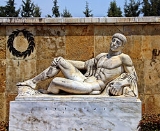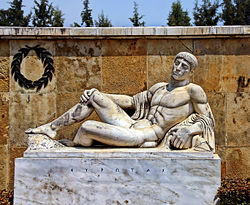
Eurotas
Encyclopedia

In Greek mythology
Greek mythology
Greek mythology is the body of myths and legends belonging to the ancient Greeks, concerning their gods and heroes, the nature of the world, and the origins and significance of their own cult and ritual practices. They were a part of religion in ancient Greece...
, Eurotas was a son of Myles
Myles
In Greek mythology, Myles was brother to Polycaon, and was the father of Eurotas who fathered Sparta after whom the city of Sparta was named. After his father died, Myles ruled Laconia. During Myles' life, he was often referred to and known as the Miller; hence he has been regarded as the inventor...
and grandson of Lelex
Lelex
In Greek mythology, Lelex was a King of Laconia. He was married to the Naiad nymph, Cleochareia. He had several sons, including Myles, Polycaon, Pterelaus, and Cteson. The parentage of Lelex is variously stated...
, eponymous
Eponym
An eponym is the name of a person or thing, whether real or fictitious, after which a particular place, tribe, era, discovery, or other item is named or thought to be named...
ancestor of the Leleges
Leleges
The Leleges were one of the aboriginal peoples of southwest Anatolia , who were already there when the Indo-European Hellenes emerged. The distinction between the Leleges and the Carians is unclear. According to Homer the Leleges were a distinct Anatolian tribe Homer...
, the pre-Greek people residing, in the myth, in the Eurotas Valley. He had no male heir, but he did have a daughter, Sparta
Sparta (mythology)
In Greek mythology, Sparta was the daughter of Eurotas by Clete. She was wife of Lacedaemon by whom she became the mother of Amyclas and Eurydice of Argos . The city of Sparta is said to have been named after her; however, the city was often called Lacedaemon as well. The two names were used...
. Eurotas bequeathed the kingdom to her husband, Lacedaemon
Lacedaemon (mythology)
In Greek mythology, Lacedaemon was a son of Zeus and the Pleaid Taygete. He was father of Amyclas and Eurydice of Argos, by Sparta, the daughter of Eurotas....
, the son of Taygete, after whom Mount Taygetus
Taygetus
Mount Taygetus, Taugetus, or Taigetus is a mountain range in the Peloponnese peninsula in Southern Greece. The name is one of the oldest recorded in Europe, appearing in the Odyssey. In classical mythology, it was associated with the nymph Taygete...
is named, and Zeus, according to Pausanias
Pausanias (geographer)
Pausanias was a Greek traveler and geographer of the 2nd century AD, who lived in the times of Hadrian, Antoninus Pius and Marcus Aurelius. He is famous for his Description of Greece , a lengthy work that describes ancient Greece from firsthand observations, and is a crucial link between classical...
. Lacedaemon renamed the state after his wife. "The city
City-state
A city-state is an independent or autonomous entity whose territory consists of a city which is not administered as a part of another local government.-Historical city-states:...
is called Sparta
Sparta
Sparta or Lacedaemon, was a prominent city-state in ancient Greece, situated on the banks of the River Eurotas in Laconia, in south-eastern Peloponnese. It emerged as a political entity around the 10th century BC, when the invading Dorians subjugated the local, non-Dorian population. From c...
to this day."
Pausanias says "It was Eurotas who channelled away the marsh-water from the plains by cutting through to the sea, and when the land was drained he called the river which was left running there the Eurotas." The "cutting through" is seen by Pausanias' translator and commentator, Peter Levy, S.J., as an explanation of Eurotas (or Vrodamas) Canyon, a ravine north of Skala
Skala
Skała is a town in southern Poland, situated in the Lesser Poland Voivodeship , previously in Kraków Voivodeship ....
where the river has cut through the foothills of Taygetus after changing direction to the west of the valley.
Variants
ApollodorusApollodorus
Apollodorus of Athens son of Asclepiades, was a Greek scholar and grammarian. He was a pupil of Diogenes of Babylon, Panaetius the Stoic, and the grammarian Aristarchus of Samothrace...
gives a slight variant of the mythological generation of Eurotas: the latter is the son of Lelex, born from the ground (autochthonos) and Cleocharia
Cleochareia
In Greek mythology, Cleochareia was a naiad, a river nymph. She was married to King Lelex of Laconia. She is the ancestress of the Spartan royal family and gave birth to two children: Myles and Polycaon. Her son, Myles, had a son named Eurotas . Eurotas had a daughter named Sparta, who married...
, a Naiad
Naiad
In Greek mythology, the Naiads or Naiades were a type of nymph who presided over fountains, wells, springs, streams, and brooks....
(water-nymph).
Pseudo-Plutarch
Pseudo-Plutarch
Pseudo-Plutarch is the conventional name given to the unknown authors of a number of pseudepigrapha attributed to Plutarch.Some of these works were included in some editions of Plutarch's Moralia...
has a somewhat different tale to tell. Taygete is not the mother of Lacedaemon, but is his wife. Their son, Himerus, having offended Venus
Venus
Venus is the second planet from the Sun, orbiting it every 224.7 Earth days. The planet is named after Venus, the Roman goddess of love and beauty. After the Moon, it is the brightest natural object in the night sky, reaching an apparent magnitude of −4.6, bright enough to cast shadows...
, thanks to her "deflowered his sister Cleodice" while he was in a drunken state. He drowned himself in the Marathon River, then renamed to the Himerus to commemorate the event.
One logical problem with the story is that, Pseudo-Plutarch asserts in the third paragraph subsequent, Tayegete, having been deflowered by Jupiter
Jupiter
Jupiter is the fifth planet from the Sun and the largest planet within the Solar System. It is a gas giant with mass one-thousandth that of the Sun but is two and a half times the mass of all the other planets in our Solar System combined. Jupiter is classified as a gas giant along with Saturn,...
, hung herself at the top of Mt. Amyclaeus, thereafter called Tayegetus. She could not therefore be the mother of Himerus and Cleodice. Robert Graves
Robert Graves
Robert von Ranke Graves 24 July 1895 – 7 December 1985 was an English poet, translator and novelist. During his long life he produced more than 140 works...
solves the problem with an additional myth of his own; he postulates another Taygete, "Taygete's niece and namesake," who marries Lacedaemon.
Pseudo-Plutarch does not elaborate the relationships of Eurotas to the above mythical characters and events. He fantasizes that mythical Sparta was at war with mythical Athens, and that Eurotas staying to fight in the time of the full moon contravened Lacedaemonian religion. He ignored the thunder and lightning sent by Zeus as a sign. Consequently he lost his entire army and drowned himself in the Himerus, subsequently called the Eurotas after him.
Perceptions of the myth
Malkin identifies the stories of Taygete and Eurotas as "land-myths," not to be taken as "historicizing." He distinguishes between land-myths and territorial myths. Territory implies a "political community," whose presence on and right to the land must be justified. In contrast, the land-myth only accounts for the terrain.Eurotas in art
River-gods are typically represented in Greek art, such as coin motifs, as figures with the bodies of bulls and the faces of humans. If only the face appears, they might wear horns and have wavy hair or be accompanied by fish. AelianClaudius Aelianus
Claudius Aelianus , often seen as just Aelian, born at Praeneste, was a Roman author and teacher of rhetoric who flourished under Septimius Severus and probably outlived Elagabalus, who died in 222...
states that the Eurotas and other rivers are like bulls.

